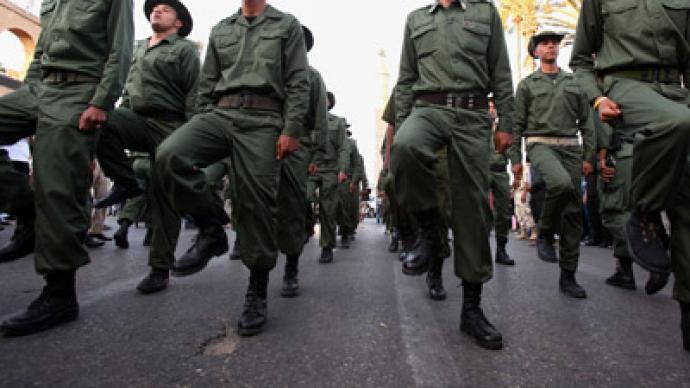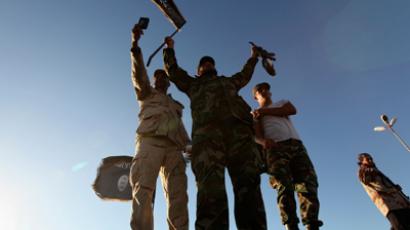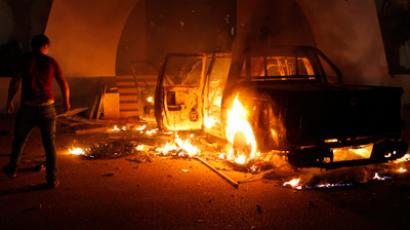US speeds up elite force creation in Libya after ambassador’s death

The US is shifting $8 million away from counterterrorism operations in Pakistan to speed up the creation of an elite force to fight Islamic extremists in Libya. The move comes as rival armed militias are still fighting for control there.
Some of the American Special Operations forces on the ground in Pakistan and Yemen will be diverted to Libya to conduct the training on the ground, along with financial assistance, the New York Times reported. To fund this project, the State Department got approval from Congress. Their stated purpose is to have a military force in Libya which could fight against extreme Islamists and prevent attacks such as the one last month when insurgents killed the US ambassador and three other staff in an American consulate in Libya.That incident prompted the fast-tracking of this project in light of the increased violence in the area. The idea is to improve “Libya’s ability to combat and defend against threats from Al-Qaeda and its affiliates,” stated an unclassified internal State Department memo, as the US continues to worry about government transition period in Libya.The project is going under the American security assistance package and the details such as the size, composition and mission guidelines along with other final decisions are still being worked out. On top of that, the internal State Department budget document to Congress shows an additional $4 million dedicated for Libya’s border security.However, some point out that the US will have to be particularly transparent. Frederic Wehrey, a senior policy analyst has warned that the maximum transparency is needed to avoid looking like it has an ulterior motive for training troops in Libya. It is not the first time the US has been training foreign troops. The most illustrative case is the Afghan army, which is now plagued with Taliban infiltrators.Rogue shootings of foreign troops with Afghans turning their weapons on their allies have claimed the lives of nearly 40 soldiers in several dozen attacks, just in 2012.
Libya’s power transition: Chaos continues
Now that the US is entering new, yet familiar waters with its new project to train Libyan forces, the main challenge of Libya’s domestic instability remains, raising questions about overall US goals in the area.The ouster of Muammar Gaddafi did not create a safer and more stable environment. This summer, interim authorities in Libya have handed over power to a nationally-elected assembly. But as numerous rival armed militias are still in control of most of Libya and the simmering violence continues against a background of an increasingly divided nation.Just this month, Libya’s town of Bani Walid came under siege from government troops seeking to arrest those responsible for the death of Omran Shaaban – the man credited with capturing Gaddafi last year. Armed Libyan forces surrounded the city, leaving residents without food and other supplies and calling on the UN for help.“The ruling party in Libya right now is an amateur government. It’s an artificial creation of the West in the post-Gaddafi regime change plan. So this gives you an indication of how they’re governing in this country and certainly there is no stability in Libya compared to before the NATO bombing and destruction of their country,” geopolitical analyst Patrick Henningsen told RT.Another recent example of chaos was a violent takeover of the Benghazi stronghold of Ansar al-Sharia militia by local residents in September, which claimed at least 11 lives and left some 70 wounded. Benghazi was once the birthplace of the uprising in Libya, but the violence points to a lack of unity in the country.Before the elections, Libya's National Transitional Council banned parties based on tribal, ethnic or religious affiliation from participating in the parliamentary elections. Those people who had proven links with the toppled regime of Colonel Gaddafi were also banned.That might explain why the majority of the 200 seats in the Assembly now belongs to individual candidates with unknown agendas.“The country is currently divided into three particular areas: the east, the west and the south. There is no central power, so when we talk about transferring power – I don’t know who is going to transfer the power and to whom they are going to transfer it? The situation is anarchic,” Dr Conn Hallinan, a columnist at Foreign Policy in Focus, told RT. “I don’t see where exactly the Assembly is going to draw its power from.” Not surprising then, that when the New York Times tried to contact a spokesman for Libya’s new President Mohamed Magariaf and other Libyan military officials to get Libya’s perspective on the new project to create a Libyan commando force trained by the US, they failed, as none of their phone calls were returned.














